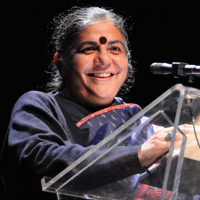TORONTO – World Food Week came to an inspired conclusion at Hart House Theatre on the campus of the University of Toronto last night (Oct.22) as internationally renowned author, ecologist, physicist and food activist, Dr. Vandana Shiva, addressed a packed house, singling out the need for every nation to adopt a new food democracy. Dr. Shiva, who completed a Ph.D in Quantum Physics at the University of Western Ontario, is leading a global resistance in what she’s calls the “War on Food.”
“Science that killed in war, has moved into agriculture,” she said of the technological advancements being made in the area of food production that are causing more harm than good. Her organization, Navdanya (Nine Seeds), has helped preserve some 2,000 varieties of rice in her homeland of India. Sadly, there used to be more than 200,000 varieties.
To change the future of food — a future Dr. Shiva claims will be bleak if the agriculture industry continues to be controlled by multinational corporations (MNCs) pushing out small farmers and dumping cheap, genetically modified foods (GMO) into local economies — GMOs, seed patents and free-trade agreements must be curtailed, she said. The global food system was once made up of 8,500 different crops, Dr. Shiva stated, but MNCs have reduced it to eight tradable commodities. In India, seeds that once cost 7 rupees, now cost 1,000. Expensive pesticides that were introduced to control the pest population on farms have helped spawn 300 times more pests. Farmer suicides have also exceeded 200,000 worldwide, she said.
“The combination of the high cost of seeds and pesticides, as well as the large-scale irrigation that’s needed to combat climate change and operate a farm, has created a system that’s pushed farmers into debts they cannot hope to get out of,” she noted, adding, “It is a war against people.”
MNCs use free-trade agreements as tools to open up new markets, she continued. “It’s so widespread there’s basically been a redefinition of rights. Only corporations have rights today, and they are commodifying all life. The commodification of food is the root of all hunger.”
It’s spurring climate change as well. If you tally up the production and transport emissions created by industrial food production and the emissions that occur from the conversion of forests (many of which are being turned into mammoth farms growing genetically modified soya, for instance), it amounts to 40 per cent of the problem — of what’s killing our ecosystems, she said. “Industrial agriculture has a lot to do with climate change. Fossil fuels are agriculture today. We are now eating oil.”
Her solution? Widespread, ecologically sound, local food systems based on biodiversity. Dr. Shiva claims that one of the biggest myths is that society needs genetically advanced agriculture to meet production demands. In fact, the combined total of every small, local, biodiverse ecosystem on Earth can produce 10 per cent more output than large-scale industrialized food production. “Food security in times of climate change is all about diversity. It gives us a cushion. It is insurance,” she said.
Dr. Shiva believes that, at its very root, ecology is food. “We must build ‘life webs’ in every nation or we will walk into extinction.” She said that MNCs are raising red flags about population growth, but they’re killing the planet with GMOs and are actually depleting the food supply. They‘re trying to control nature, but we’re not gaining food quantity or quality.
“Food is an intimate act. When it loses intimacy, it becomes non-food.”
Hart House at U of T develops and promotes awareness and education regarding food politics and sustainability. World Food Week was organized by Arlene Stein, director of Events and Catering at Hart House, and her hard-working team. It included seven days of workshops, lectures and discussions that explored the relationship between communities and food.
Photo courtesy of Jo Dickins


















